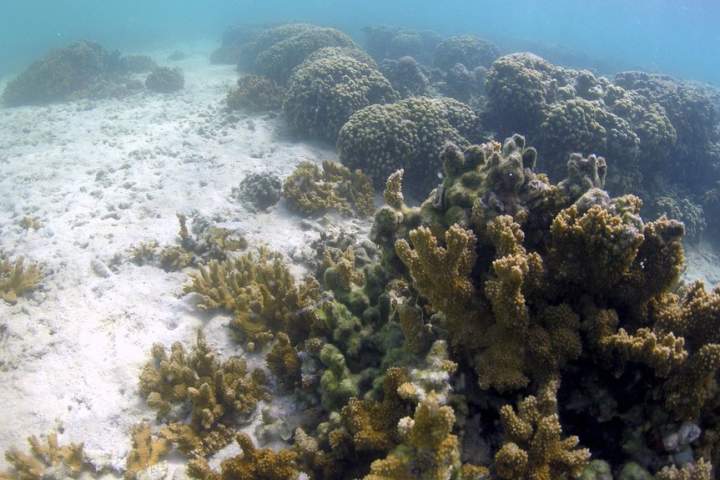Science
Coral Reefs Face Tipping Point as Global Warming Escalates

The world’s coral reefs are nearing an almost irreversible die-off, as climate change accelerates beyond critical thresholds, according to a significant report released by over 160 scientists. This alarming finding marks the first “tipping point” in the collapse of ecosystems driven by climate change. The Global Tipping Points report, which synthesizes the latest scientific research, comes just weeks before the COP30 climate summit scheduled to take place near the Amazon rainforest in Brazil.
Climate models indicate that the Amazon rainforest, which plays a crucial role in regulating global weather patterns, is at risk of collapsing if average global temperatures exceed 1.5 degrees Celsius. This revised estimate highlights the urgency for immediate action, as deforestation rates continue to threaten this vital ecosystem. Additionally, the report warns of potential disruptions to the Atlantic Meridional Overturning Circulation (AMOC), a major ocean current that moderates winter temperatures in northern Europe.
Fast-Approaching Climate Change Impacts
Tim Lenton, an environmental scientist at the University of Exeter and the lead author of the report, expressed concern over the rapid pace of climate change. He stated, “Change is happening fast now, tragically, in parts of the climate, the biosphere.” The report highlights that average global temperatures have already risen by approximately 1.3-1.4 degrees Celsius above preindustrial levels.
The last two years have been recorded as the warmest in history, with marine heatwaves affecting 84 percent of the world’s coral reefs, leading to widespread bleaching and mortality. Coral reefs are vital as they support around a quarter of all marine life. To facilitate recovery, the report emphasizes the need for a drastic reduction in global temperatures to just 1 degree Celsius above preindustrial averages.
Despite the grim outlook, Lenton noted some positive developments. For the first time, renewable energy sources have surpassed coal in electricity generation, according to data from the nonprofit think tank Ember. “Nobody wants to be just traumatized and disempowered,” he said. “We still have some agency.”
Urgent Call to Action at COP30
The scientists involved in the report are urging nations attending the upcoming COP30 to commit to reducing carbon emissions that contribute to climate change. Their findings reveal a concerning trend: each year sees an increase in the magnitude and scope of climate change’s negative impacts. Pep Canadell, a senior scientist at Australia’s CSIRO Climate Science Centre, emphasized the urgency of the situation, stating, “The new report makes clear that each year there is an increase in the scope and magnitude of the negative impacts of climate change.”
Current trajectories suggest the planet is heading towards an alarming 3.1 degrees Celsius of warming by the end of this century if existing national policies continue unaltered. This scenario necessitates immediate and substantial global action to avert the catastrophic consequences of climate change on coral reefs and other essential ecosystems. With the COP30 summit approaching, the scientific community’s clarion call for action could not be more pressing.
-

 Science3 months ago
Science3 months agoToyoake City Proposes Daily Two-Hour Smartphone Use Limit
-

 Health4 months ago
Health4 months agoB.C. Review Reveals Urgent Need for Rare-Disease Drug Reforms
-

 Top Stories4 months ago
Top Stories4 months agoPedestrian Fatally Injured in Esquimalt Collision on August 14
-

 Technology3 months ago
Technology3 months agoDark Adventure Game “Bye Sweet Carole” Set for October Release
-

 World3 months ago
World3 months agoJimmy Lai’s Defense Challenges Charges Under National Security Law
-

 Lifestyle4 months ago
Lifestyle4 months agoVictoria’s Pop-Up Shop Shines Light on B.C.’s Wolf Cull
-

 Technology3 months ago
Technology3 months agoKonami Revives Iconic Metal Gear Solid Delta Ahead of Release
-

 Technology3 months ago
Technology3 months agoApple Expands Self-Service Repair Program to Canada
-

 Technology3 months ago
Technology3 months agoSnapmaker U1 Color 3D Printer Redefines Speed and Sustainability
-

 Technology3 months ago
Technology3 months agoAION Folding Knife: Redefining EDC Design with Premium Materials
-

 Technology4 months ago
Technology4 months agoSolve Today’s Wordle Challenge: Hints and Answer for August 19
-

 Business4 months ago
Business4 months agoGordon Murray Automotive Unveils S1 LM and Le Mans GTR at Monterey









